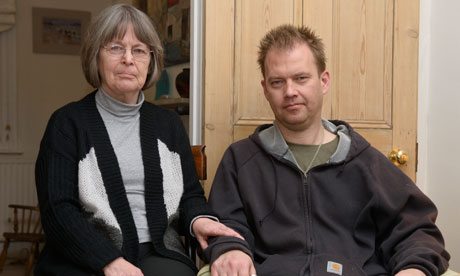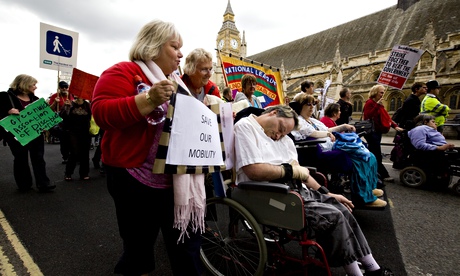Fourteen years ago, Christian Dalley sustained serious brain damage in a motorbike accident and had to undergo two emergency lobotomies in the days after the crash. Although in some ways his recovery has been remarkable, the injuries to his brain have left him barely able to read and struggling to organise his life.
His neurosurgeon's assessment is that he will find it "very difficult to return to any form of paid employment", a conclusion that Dalley, with some regret, views as accurate.
However, shortly before Christmas, Dalley had his third Atos work capability assessment in as many years. He points out that since 2009, he has been caught up in a near-continuous process of persuading benefits staff that he cannot work. He was twice ruled fit for work and he twice appealed against the decision at a tribunal, where judges on both occasions found him not capable of working and reinstated sickness benefits.
Charities have expressed anger at the number of people with long-term, incurable conditions who are caught in a similar cycle, being forced on repeated occasions to prove that they are not able to work, despite supplying medical evidence that indicates that their condition is permanent and will not improve.
Dalley, now 41, was beginning a career as a fashion designer when he was thrown off his bike in October 1998. Because the swelling in his brain did not subside, he had to have a frontal lobotomy and later, when that did not work, part of his brain and skull was removed at the back to help reduce the swelling. He spent three months in hospital.
Gradually, he regained his ability to speak and walk, but his brain function remains severely impaired in less immediately obvious ways. Despite repeated attempts he has never managed to return to work. His eyesight has been badly damaged, he finds reading extremely difficult and he becomes overwhelmed by basic tasks.
He tried working in a bar, but wasn't able to do the work and found trying to keep up very stressful; he suffered a huge seizure at work shortly after starting the job.
Dalley's mother, Gillian, says part of the problem is that he does not fully understand the severity of his own impairments, so focuses too much on the positive during the assessment process.
He said: "One of the issues is the embarrassment of the situation. Reading is such a basic thing. I don't want people to think I am thick, so I try to avoid mentioning it."
He supplied medical evidence indicating that his condition was unlikely to improve, but twice the assessors found him capable of work, and twice their decision has been overturned by a tribunal. In March 2012, a tribunal awarded him 18 points (15 points are needed to qualify for the benefit). A few months earlier the Atos assessment had awarded him zero points. In November, he was invited again to attend another assessment.
His neurosurgeon, Alexander Leff, has written a detailed report explaining the extensive damage to Dalley's brain, summarising the surgery, during which part of his skull and brain were removed, outlining his current difficulties and concluding that his patient would struggle to get a paid job.
"It was a euphoric moment when we had the decision from the tribunal the second time, and then just a few months later, the process began again," Gillian Dalley said, expressing frustration about the unsettling effect of constantly being required to reaffirm her son's disabilities.
A spokesperson for the Department for Work and Pensions (DWP) said that repeated reassessment was an important part of the process of applying for employment and support allowance (which has replaced incapacity benefit). "Even for claimants who are unlikely to see an improvement in their health, it is important that we do not write them off and are able to offer them further support where necessary," the spokesperson said.
An Atos Healthcare spokesperson said it was difficult to comment on an individual's case, but added: "Anybody who is not satisfied with their assessment has the right to complain to us directly and we will review their case and take action where appropriate."
Several charities that support people with lifelong conditions that are unlikely to change have campaigned against the system's insensitivity.
Sarah Lambert, head of policy at the National Autistic Society, said: "We would question whether frequent benefit reviews is the best use of public money for people with lifelong conditions that aren't going to change. Assessors also need more training in hidden disabilities so they are better able to recognise people's needs from the outset."
The Rutherglen and Hamilton West Labour MP, Tom Greatrex, who has campaigned for reform to the fitness-to-work test, said he was frequently contacted by people with incurable conditions who were caught in a similar cycle and felt they were being "hounded".
"I am regularly contacted by constituents with Parkinson's disease, receiving treatment for cancer or suffering from mental health problems, who have been found fit for work, even though they are clearly no such thing. They are then trapped in a cycle of assessment, successful appeal and then reassessment just a few months later," he said.
"The fact that people have to wait months for a test, and then up to another nine months if they appeal, causes unnecessary anxiety for individuals, as well as costing the taxpayer millions."
Dalley said the process of repeatedly battling again the DWP was exhausting. "I feel persecuted. The system feels so faceless. I understand the logic of retesting people but all the doctors say my case is unlikely to improve," he said.
Despite being told he should search for work, he has had no support from a disability employment adviser, and the rehabilitation centre that used to support him has closed because of funding cuts.











